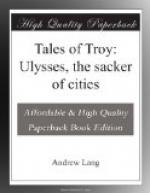So Patroclus ran off to Achilles; but, on his way, he met the wounded Eurypylus, and he took him to his hut and cut the arrow out of his thigh with a knife, and washed the wound with warm water, and rubbed over it a bitter root to take the pain away. Thus he waited for some time with Eurypylus, but the advice of Nestor was in the end to cause the death of Patroclus. The battle now raged more fiercely, while Agamemnon and Diomede and Ulysses could only limp about leaning on their spears; and again Agamemnon wished to moor the ships near shore, and embark in the night and run away. But Ulysses was very angry with him, and said: “You should lead some other inglorious army, not us, who will fight on till every soul of us perish, rather than flee like cowards! Be silent, lest the soldiers hear you speaking of flight, such words as no man should utter. I wholly scorn your counsel, for the Greeks will lose heart if, in the midst of battle, you bid them launch the ships.”
Agamemnon was ashamed, and, by Diomede’s advice, the wounded kings went down to the verge of the war to encourage the others, though they were themselves unable to fight. They rallied the Greeks, and Aias led them and struck Hector full in the breast with a great rock, so that his friends carried him out of the battle to the river side, where they poured water over him, but he lay fainting on the ground, the black blood gushing up from his mouth. While Hector lay there, and all men thought that he would die, Aias and Idomeneus were driving back the Trojans, and it seemed that, even without Achilles and his men, the Greeks were able to hold their own against the Trojans. But the battle was never lost while Hector lived. People in those days believed in “omens:” they thought that the appearance of birds on the right or left hand meant good or bad luck. Once during the battle a Trojan showed Hector an unlucky bird, and wanted him to retreat into the town. But Hector said, “One omen is the best: to fight for our own country.” While Hector lay between death and life the Greeks were winning, for the Trojans had no other great chief to lead them. But Hector awoke from his faint, and leaped to his feet and ran here and there, encouraging the men of Troy. Then the most of the Greeks fled when they saw him; but Aias and Idomeneus, and the rest of the bravest, formed in a square between the Trojans and the ships, and down on them came Hector and Aeneas and Paris, throwing their spears, and slaying on every hand. The Greeks turned and ran, and the Trojans would have stopped to strip the armour from the slain men, but Hector cried: “Haste to the ships and leave the spoils of war. I will slay any man who lags behind!”
On this, all the Trojans drove their chariots down into the ditch that guarded the ships of the Greeks, as when a great wave sweeps at sea over the side of a vessel; and the Greeks were on the ship decks, thrusting with very long spears, used in sea fights, and the Trojans were boarding the ships, and striking with swords and axes. Hector had a lighted torch and tried to set fire to the ship of Aias; but Aias kept him back with the long spear, and slew a Trojan, whose lighted torch fell from his hand. And Aias kept shouting: “Come on, and drive away Hector; it is not to a dance that he is calling his men, but to battle.”




